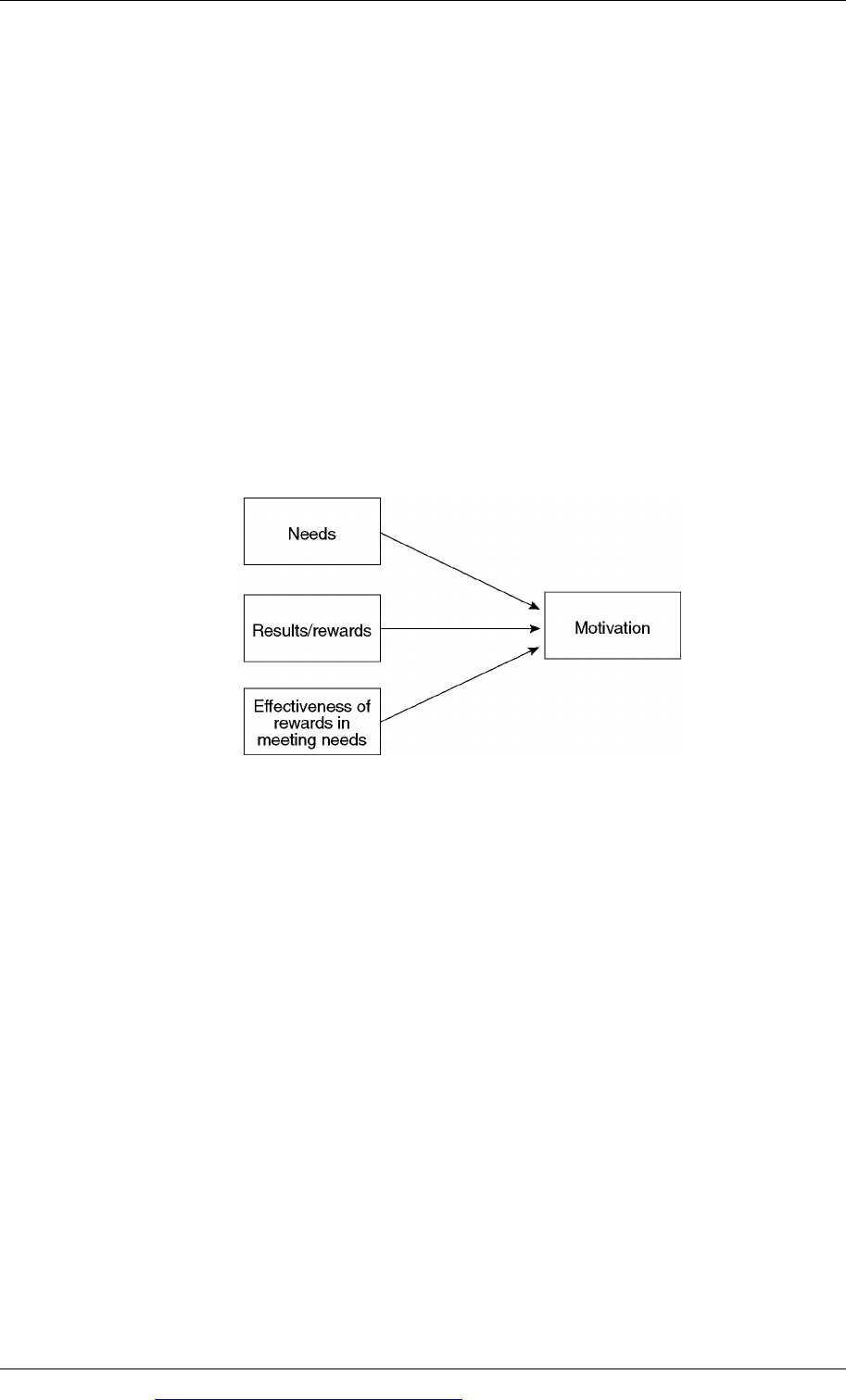ACCA F1 Accountant in Business - 2010 - Study text - Emile Woolf Publishing
Подождите немного. Документ загружается.


Chapter 9: Motivation
© EWP Go to www.emilewoolfpublishing.com for Q/As, Notes & Study Guides 295
1.8 Handy: motivation calculus and psychological contracts
Motivation calculus
Charles Handy suggested that there is a motivation calculus. His ideas were similar
to those of Vroom. He argued that the strength of an individual’s motivation is
dependent on three factors:
Needs. These are the needs of the individual. They might include any of the
needs in the Maslow hierarchy of needs. Needs are also affected by the
personality characteristics of the individual, and by outside pressures and
influences.
Results/rewards. Individuals must be able to measure the effect that their
individual efforts have on results. If the individual is motivated to put in more
effort, how will this affect results and rewards?
Effectiveness. This is the perception of the individual that the rewards that have
been earned meet the needs of the individual.
Psychological contracts
Handy argued that the motivation calculus applies to every type of ‘psychological
contract’ between an individual and an organisation to which the individual
belongs.
Every individual has a psychological contract with any organisation to which he or
she belongs. This contract normally takes the form of implied and un-stated
expectations about:
the returns or rewards that the individual will receive
in return for putting in a certain amount of effort and talent.
Similarly, organisations have expectations of:
what they expect individuals to do, and
the rewards that they will give to individuals in return.

Paper F1: Accountant in business
296 Go to www.emilewoolfpublishing.com for Q/As, Notes & Study Guides © EWP
There are three types of psychological contract:
Coercive contracts. This is a contract that is not freely entered into. The
organisation is ruled by a small number of people who are in charge and in
control. An example of a coercive contract is the relationship between a prisoner
and his prison.
Calculative contracts. This is a contract that is freely entered into, but where
management retain control through their ability to reward individuals with
extrinsic rewards, such as pay and promotion. Individuals enter these contracts
believing that what they receive justifies the amount of effort they put in. The
relationship between many employees and their employer is a calculative
contract.
Co-operative contracts. A co-operative contract is a contract between ‘equals’.
The individual identifies with the goals of the organisation and works hard to
achieve them. In return, the individual is rewarded fairly, and is given a chance
to participate in setting the organisation’s goals and deciding on the ways to
achieve them. Some organisations have adopted this approach to their
employees, but the relationship must be freely entered into by the employees.
1.9 McClelland: motivational needs theory
David McClelland (1917 – 1998) put forward a motivational needs theory, which he
developed into a needs-based motivational model.
He argued that there are three needs that are found in all employees. Everyone
displays all three needs, but one of the three needs is often dominant in affecting the
individual’s attitudes and behaviour. The three needs are:
a need for achievement (‘n-ach’)
a need for authority and power (‘n-pow’)
a need for affiliation (‘n-affil’).
He identified the characteristics of individuals who are motivated mainly by the
needs for achievement, power and affiliation, as follows:
N-ach person. This person seeks achievement. Targets for achievement should
be realistic but challenging goals. The person also seeks advancement in the job,
and has a need for:
- feedback: this is information about his achievements and progress towards the
goals – the individual needs to know whether or not the goals are being met
- a sense of accomplishment from achieving the goals.
N-pow person. This person needs to be influential and effective, and to make an
impact. He has a strong need to lead, and for his ideas to be accepted rather than
the ideas of others. He needs status and prestige.
N-affil person. This person needs friendly relationships and is motivated by
interaction with other people. He needs to be liked and held in high regard. He
makes a good ‘team player’.

Chapter 9: Motivation
© EWP Go to www.emilewoolfpublishing.com for Q/As, Notes & Study Guides 297
McClelland argued that n-ach people make the best leaders. However, they can
demand too much from their employees, because they often assume that everyone
else is motivated by the same need for achievement that they have.
N-affil individuals are usually poor leaders. This is because their need to be
liked will often affect their objectivity and prevent them at times from making
unpopular but necessary decisions.
N-pow individuals are also poor leaders. They are often determined individuals,
with a strong work ethic and a commitment to their organisation and its goals.
However, they often lack ‘people skills’ (skills at dealing with other people) and
also lack flexibility.
Achievement-motivated individuals are usually the ones who make things happen
and get results.
They set goals that they can influence (so the goals are achievable): this is a
characteristic of successful businessmen and entrepreneurs.
They consider achievement more important than financial rewards.
Achieving a goal or successfully completing a task gives them more satisfaction
than praise or thanks from others.
Security and status are not prime motivators for them in their work.
They are constantly looking for ways to do things better.
Crucially, however, they need feedback about their performance. They must be
told about their actual performance and what they have achieved.
For achievers, pay is a form of feedback about their performance. High pay and
bonuses are a measurement of their success in achieving goals.

Paper F1: Accountant in business
298 Go to www.emilewoolfpublishing.com for Q/As, Notes & Study Guides © EWP
Reward systems and motivation
Extrinsic and intrinsic rewards
What managers can do to motivate staff
The reward system and motivation
Constructive feedback and motivation
2 Reward systems and motivation
2.1 Extrinsic and intrinsic rewards
For an individual, rewards from doing a job can be both extrinsic and intrinsic.
Extrinsic rewards are rewards that are outside the control of the individual.
Another person, often the individual’s boss, has the power to provide extrinsic
rewards. The main examples of extrinsic rewards are:
basic pay (and the size of a pay increase)
cash bonuses and incentive payments
when the employer is a company, rewards in the form of share options or a gift
of some shares
pension benefits
free medical insurance (and other forms of insurance, such as disability
insurance, or even life assurance)
the award of a company car, or a company helicopter or jet
subsidised loans (these are loans from the company at an interest rate that is
lower than the normal market rate).
Intrinsic rewards are rewards that are within the control of the individual himself.
They include:
a sense of achievement in doing the work
a sense of recognition for doing the work
enjoying the status that the job provides
pride in doing the work
personal satisfaction from doing the work
a sense of responsibility, that the individual enjoys.
According to theorists such as Vroom and Handy, the strength of the motivation of
an individual depends partly on how strongly the individual wants these rewards –
and how big are the expected rewards.

Chapter 9: Motivation
© EWP Go to www.emilewoolfpublishing.com for Q/As, Notes & Study Guides 299
2.2 What managers can do to motivate staff
There are differing views on how individuals are motivated. Consequently, there
are differing views about what management can do to improve the motivation of
their employees.
There is a view that management must get the ‘basics right’ first: they must
offer a fair pay structure for staff and fair employment policies – to meet the
physiological needs and security needs of their employees (Maslow) or to
prevent dissatisfaction from employees (Herzberg).
Herzberg argued that management should take some measures to prevent
dissatisfaction, but that a completely different approach is also needed in order
to create motivation. Herzberg believed that job enrichment was a key to better
motivation.
Adams argued that the rewards system should be seen to be fair: however,
rewards can be intrinsic rewards as well as extrinsic rewards such as higher pay.
McGregor and Argyris argued in favour of a participative style of management,
and getting employees involved in problem-solving and decision-making. They
argued that this management style gets more out of employees, and this
improves the performance of the organisation.
McClelland argued that the best leaders were individuals with a need for
achievement. Management should therefore try to identify and develop high
achievers.
One of the factors affecting the strength of motivation is the belief that the
individual’s efforts will lead to better performance. Managers should therefore
try to increase the strength of this expectancy. Vroom argued that managers
should give encouragement and advice to their employees, give them the
resources they need to accomplish their tasks and, where necessary, give them
suitable training.
It can also be argued that managers can motivate staff by providing inspiring
leadership.
The ability of managers to motivate their employees may also be affected by the
differing needs of different employees. Whereas some content theorists (Herzberg)
argued that all individuals were motivated by the same needs, there are differing
views that:
different people have different needs (for example, McClelland, Vroom)
these needs can change over time (for example, Maslow).
It seems clear, however, that:
managers can influence the motivation of their employees
needs as well as rewards are an important factor in motivation, therefore
managers must try to understand what the needs of their employees are, and
what rewards – intrinsic as well as extrinsic – will help to satisfy those needs.

Paper F1: Accountant in business
300 Go to www.emilewoolfpublishing.com for Q/As, Notes & Study Guides © EWP
2.3 The reward system and motivation
The reward system refers to the system of ‘extrinsic’ rewards that an organisation
can give to its employees. The most significant extrinsic rewards are usually:
pay (remuneration), and
promotion or advancement.
Elements of pay include basic pay, bonuses, commissions, premium pay for
working overtime, pension rights and so on.
It is generally agreed that individuals need to be kept satisfied about their pay, in
order to avoid feelings of dissatisfaction or inequality and unfairness.
Dissatisfaction about pay will affect the attitudes and behaviour of individuals in
their work.
It is not certain, however, whether offering pay incentives will increase the
motivation of employees. (It is also not certain that extra motivation will lead to
better performance.)
McClelland would have argued that pay rewards might be seen as a measure of
recognition and goal accomplishment by high achievers. Rewards in the form of
higher pay or bonuses may therefore be an important motivator.
It may also be argued that getting paid more for better performance (for example
receiving a cash bonus) is important for many individuals, because the money
can be used to fulfil some important needs.
Process theories of motivation often place strong emphasis on financial rewards,
because money can be used to buy satisfaction of many needs.
There is also a view that group reward systems are able to improve the collective
motivation of teams.
However, as explained already, there is also a view that in many organisations, pay
systems do not provide motivation, and employees can be motivated by other
things, such as participation in decision-making or an ‘enriched’ job.
Performance-related pay for individuals
Even so, many organisations in practice do have systems for rewarding individuals
for the achievement of certain levels of performance or performance targets.
Performance-related pay may be cash bonuses or other forms of incentive.
Cash bonuses are payments in cash that are related to meeting short-term
targets, such as meeting budget targets such as achieving or exceeding a profit
target. Sales representatives may be paid a sales commission based on the value
of sales they have won during a period of time. Performance targets do not have
to be financial targets: cash bonuses might be paid to an individual who achieves
a specific non-financial target, such as completing a particular task on time or
before a specified date.
Incentives for the achievement of longer term goals are often paid to senior
managers, often in the form of company shares or share options.

Chapter 9: Motivation
© EWP Go to www.emilewoolfpublishing.com for Q/As, Notes & Study Guides 301
If companies use a system of performance-related pay, they presumably believe that
the pay incentives are successful in motivating employees. If they did not think that
this was the case, there would be no point in offering the incentives!
It is also important to remember that rewards are not always given in the form of
pay. Promotion and recognition may be equally important to an individual.
However, there is a limit to the number of individuals who can be rewarded with
promotion, especially in small business entities.
Performance-related pay for groups
Cash bonuses might be paid to groups of workers, such as all the employees in a
department, section or project team. For group bonuses to be effective as a
motivator, however, it is important that individuals should identify themselves with
the group and should believe that the efforts of the group as a whole are capable of
earning a bonus.
A problem with group bonuses, however, is to decide how the total bonus for the
group as a whole should be divided between the individual group members. If the
basis for sharing the bonus is seen as unfair, a bonus payment might create
resentment and arguments rather than act as a motivator.
Company-wide bonuses
Sometimes a company pays a bonus to all its employees, particularly if it has had a
highly profitable year. For example in 2007, UK stores group Marks and Spencer
announced strong profits growth for the previous year and a £91 million bonus to
be shared by all its employees as a reward. Such a bonus might help to persuade
employees to remain with the company, but it is doubtful whether it can be effective
in motivating individual employees to do their work more efficiently or effectively.
Bonuses and performance
For a cash bonus scheme to be effective, the payment of a bonus should be clearly
linked to the performance of an individual (for individual bonuses) or a group (for
group bonuses). A clear link can only be established when the following conditions
apply:
The performance of the individual or group can be measured.
The individual or group can affect the measured performance through efficient
or effective working. As stated in some of the earlier descriptions of motivation
theory, there should be a connection between effort (motivation) and outcome.
2.4 Constructive feedback and motivation
Process theories of motivation emphasise the importance of:
the link between putting in more effort and improving performance (or reaching
targets), and
the link between reaching targets and obtaining rewards.

Paper F1: Accountant in business
302 Go to www.emilewoolfpublishing.com for Q/As, Notes & Study Guides © EWP
Individuals need to know how they are performing, and whether they are on course
for achieving their goals.
If they are not on target for achieving their goals, they need to be given advice and
guidance from their boss.
The process of providing information to individuals about their performance is an
example of feedback. Feedback should be constructive and helpful, rather than
critical, to maintain the motivation of the individual. If individuals are criticised in a
negative way for failing to reach their goals, their motivation will disappear.
A system for providing constructive feedback about performance (but not the only
system) is a system of job appraisal. This was described in an earlier chapter.

© EWP Go to www.emilewoolfpublishing.com for Q/As, Notes & Study Guides 303
Paper F1
AccountantinBusiness
CHAPTER
10
Recruitment and selection
Contents
1 The recruitment and selection process
2 Effective recruitment
3 Job descriptions and person specifications
4 Job analysis
5 The changing nature of employment
6 Selection methods
7 The selection decision
8 The selection interview
9 Equal opportunities and the management of
diversity

Paper F1: Accountant in business
304 Go to www.emilewoolfpublishing.com for Q/As, Notes & Study Guides © EWP
The recruitment and selection process
The importance of effective recruitment and selection
Stages in the recruitment and selection process
Roles and responsibilities for recruitment and selection
Recruitment and the HR plan
Reasons for ineffective recruitment and selection
Evaluating the recruitment and selection process
1 The recruitment and selection process
1.1 The importance of effective recruitment and selection
The people who work for an organisation are extremely valuable assets. Without its
employees, an organisation would not exist and could not operate. The efficiency
and effectiveness of an organisation depend on the skills and abilities of its
employees.
Over time, changes occur in the work force.
Some existing employees leave the organisation, for example to take a job
somewhere else or on retirement.
Employees who have acquired enough skills and experience might be moved on
to other jobs within the organisation that make better use of their developing
talent.
The labour requirements of the organisation will change, as new jobs are created
and old jobs are no longer required. People are recruited to fill the new jobs,
with new skills. Some existing employees might be made redundant.
Changes in the work force must be properly managed, in order to make sure that
the work force remains efficient and effective. It is therefore important to make sure
that job vacancies are filled when they occur. It is also important to make sure that
suitable individuals are appointed to do the jobs.
1.2 Stages in the recruitment and selection process
Recruitment and selection are two stages in the process of filling job vacancies.
Recruitment starts when a job vacancy is identified. It is the process of obtaining
a supply of suitable possible candidates to fill the vacancy. When job vacancies
arise, an organisation needs a number of individuals to choose from, and these
individuals:
- must seem able to do the job and
- should also want to do the job.
Selection is the process of appointing the most suitable candidate to a job
vacancy, by choosing the best individual from the candidates available.
